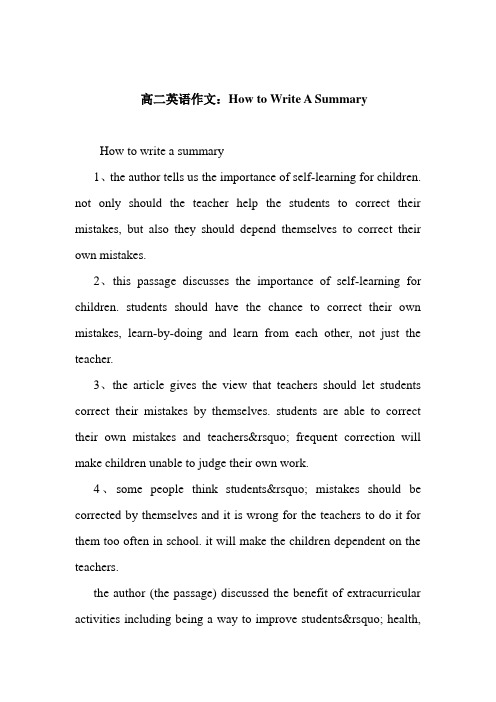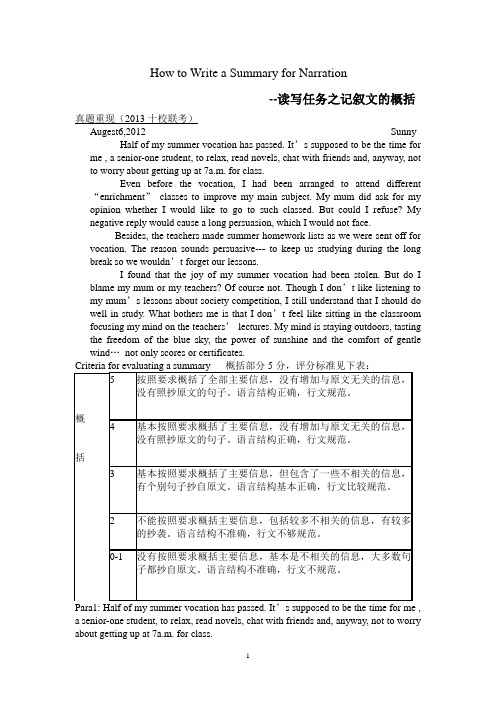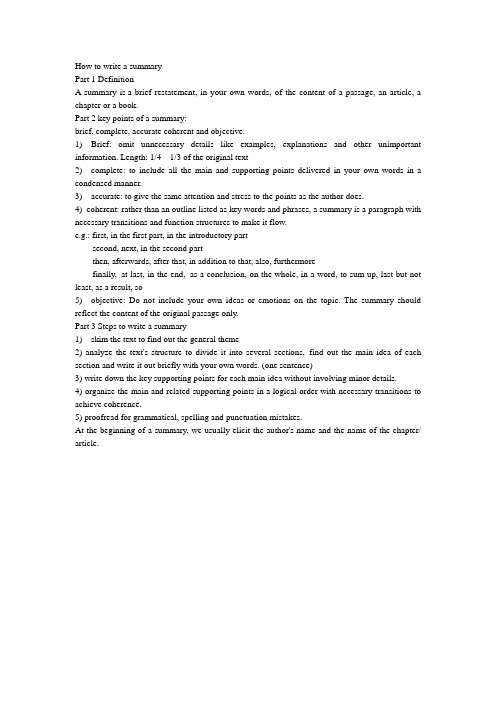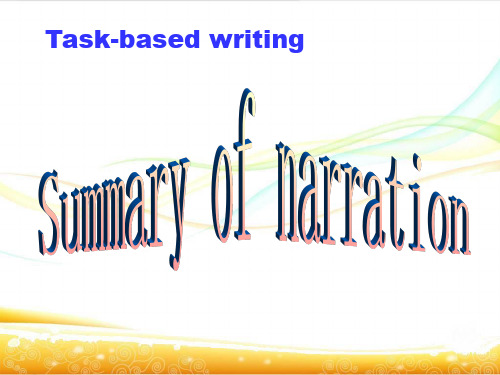高中英语How to make a summary of a narration优秀微课课件
- 格式:ppt
- 大小:1.52 MB
- 文档页数:5

高二英语作文:How to Write A SummaryHow to write a summary1、the author tells us the importance of self-learning for children. not only should the teacher help the students to correct their mistakes, but also they should depend themselves to correct their own mistakes.2、this passage discusses the importance of self-learning for children. students should have the chance to correct their own mistakes, learn-by-doing and learn from each other, not just the teacher.3、the article gives the view that teachers should let students correct their mistakes by themselves. students are able to correct their own mistakes and teachers’ frequent correction will make children unable to judge their own work.4、some people think students’ mistakes should be corrected by themselves and it is wrong for the teachers to do it for them too often in school. it will make the children dependent on the teachers.the author (the passage) discussed the benefit of extracurricular activities including being a way to improve students’ health,widen their social circle and introduce them to new ideas and people.reviews the most important points of the text. it should be brief (short). furthermore, the summary should be written as much as possible in your own words. it contains only the main ideas and what the author talks about the topic but not include much explanation or examples.。

How to Write a Summary for Narration--读写任务之记叙文的概括真题重现(2013十校联考)Augest6,2012 Sunny Half of my summer vocation has passed. It’s supposed to be the time for me , a senior-one student, to relax, read novels, chat with friends and, anyway, not to worry about getting up at 7a.m. for class.Even before the vocation, I had been arranged to attend different “enrichment”classes to improve my main subject. My mum did ask for my opinion whether I would like to go to such classed. But could I refuse? My negative reply would cause a long persuasion, which I would not face.Besides, the teachers made summer homework lists as we were sent off for vocation. The reason sounds persuasive--- to keep us studying during the long break so we wouldn’t forget our lessons.I found that the joy of my summer vocation had been stolen. But do Iblame my mum or my teachers? Of course not. Though I don’t like listening to my mum’s lessons about society competition, I still understand that I should do well in study. What bothers me is that I don’t feel like sitting in the classroom focusing my mind on the teachers’lectures. My mind is staying outdoors, tasting the freedom of the blue sky, the power of sunshine and the comfort of gentle wind…not only scores or certificates.a senior-one student, to relax, read novels, chat with friends and, anyway, not to worry about getting up at 7a.m. for class.Summary:Skills:Para2: Even before the vocation, I had been arranged to attend different “enrichment”classes to improve my main subject. My mum did ask for my opinion whether I would like to go to such classes. But could I refuse? My negative reply would cause a long persuasion, which I would not face.Summary:Para3: Besides, the teachers made summer homework lists as we were sent off for vocation. The reason sounds persuasive--- to keep us studying during the long break so we wouldn’t forget our lessons.Summary:Skills:Para4: I found that the joy of my summer vocation had been stolen. But do I blame my mum or my teachers? Of course not. Though I don’t like listening to my mum’s lessons about society competition, I still understand that I should do well in study. What bothers me is that I don’t feel like sitting in the classroom focusing my mind on the teachers’lectures. My mind is staying outdoors, tasting the freedom of the blue sky, the power of sunshine and the comfort of gentle wind…not only scores or certificates.Summary:Skills:Passage 1(2010茂名一模)A little boy is telling his Grandma how "everything" is going wrong. School, family problems, severe health problems, etc.Meanwhile, Grandma is baking a cake. She asks her grandson if he would like a cake, which, of course, he does."Here, have some cooking oil.""Terrible!" says the boy."How about a couple raw eggs?"" Terrible! Grandma!""Would you like some flour then? Or maybe baking soda?""Grandma, those are all awful!"To which Grandma replies: “Yes, all those things seem bad by themselves, but when they are put together in the right way, they make a wonderfully delicious cake! Life works the same way. The trials(考验)of life serve a meaningful purpose in making us stronger.” Do not lose heart if life is not easy for you right now, butencourage yourself and know you will be much stronger mentally and physically because of the trials of life. ”Find out the main factors.Who :What happened?The result:What can you learn from the story?Paraphrase the main factorsA little boy is telling his Grandma how "everything" is going wrong.The trials(考验)of life serve a meaningful purpose in making us stronger.Join the main factors togetherA boy _________ about difficulties in life. His grandmother, who _______ that a cake tasted delicious but its ____________tasted awful,________ him that the________ of life make people_________.Tips:1.focus: Who + what + the lesson (at the end)e general(概括性) words instead of specific(具体的) words )3. add some conjunctions to make it coherent.Can you score the summaries?1. I felt upset because I had been arranged to attend different “enrichment”classes and the teachers made summer homework lists. My mind is staying outdoors.Problems :2. As the summer vocation came, the student had to take part in enrichment classes and finish lots of homework, so he had no time to relax himself, read novels or chat with friends.Problems :Group work: evaluationWork in groups of sixWrite down a summary for Passage 2 and judge the summaries in your group. Choose the best one and give your reason.Conclusion :Learning tips for writing a summaryDos:1. Find out the topic sentence.2. Paraphrase the topic sentence.3. Draw the main idea yourself if there is no topic sentence.4. Omit the details (examples, repetitions & specific words)5. Write it in about 30 words6. Write it in the third person and proper tense.7. Remember to add some conjunctions to make it coherent(连贯的).8. Use general words instead of specific words.Don’ts:1. Don’t include your own opinion.2. Don’t copy the original sentences.实践练习Text 1One morning, Mr Hare was running on the road. Suddenly he saw Mr Tortoise, who was also running on the road towards him. Mr Hare ran up to Mr Tortoise and laughed at him. Mr Tortoise got angry and wouldn't take failure lying down, so he suggested having a race to see who could first get to the big tall tree by the roadsides. Mr Hare agreed with him without hesitation. The race began. Mr Hare and Mr tortoise started from the same line at the same time. When Mr Hare was far ahead of Mr Tortoise and even couldn't see Mr Tortoise, he thought that Mr Tortoise fell behind and couldn't catch up with him. So he stopped and lay down to have a nap. But soon he fell asleep. At the same time, Mr Tortoise kept on running and running. When Mr Hare woke up, he found Mr Tortoise had already sat under the tree and was smiling at him![写作内容]1)以大约30个词概括短文的要点;2)以大约120个词写一篇记叙文,描写你或你的朋友因骄傲而落后的一次经历,并包含以下内容:a)谈谈这则故事给人们的启示;b)叙述你或你的朋友因骄傲而落后的一次真实或虚构的经历;c)谈谈这次经历对你或你的朋友思想态度的影响。


How to write a summaryPart 1 DefinitionA summary is a brief restatement, in your own words, of the content of a passage, an article, a chapter or a book.Part 2 key points of a summary:brief, complete, accurate coherent and objective.1) Brief: omit unnecessary details like examples, explanations and other unimportant information. Length: 1/4---1/3 of the original text2) complete: to include all the main and supporting points delivered in your own words in a condensed manner.3) accurate: to give the same attention and stress to the points as the author does.4) coherent: rather than an outline listed as key words and phrases, a summary is a paragraph with necessary transitions and function structures to make it flow.e.g.: first, in the first part, in the introductory partsecond, next, in the second partthen, afterwards, after that, in addition to that, also, furthermorefinally, at last, in the end, as a conclusion, on the whole, in a word, to sum up, last but not least, as a result, so5) objective: Do not include your own ideas or emotions on the topic. The summary should reflect the content of the original passage only.Part 3 Steps to write a summary1) skim the text to find out the general theme2) analyze the text's structure to divide it into several sections, find out the main idea of each section and write it out briefly with your own words. (one sentence)3) write down the key supporting points for each main idea without involving minor details.4) organize the main and related supporting points in a logical order with necessary transitions to achieve coherence.5) proofread for grammatical, spelling and punctuation mistakes.At the beginning of a summary, we usually elicit the author's name and the name of the chapter/ article.。


写摘要时可以采用下列几种小技巧:1) 删除细节。
只保留主要观点。
2) 避免重复。
在原文中,为了强调某个主题,可能会重复论证说明。
但是这在摘要中是不能使用的。
应该删除那些突出强调的重述句。
3) 删除具体例子。
不过,阅读材料本身是由几个具体例子构成的,如阅读材料是谈西方种种节日的,如删除具体例子,则概括很难达到30个词,那就选择一至两个例子(即一两个主要节日)。
注:原文中可能包括5个或更多的例子,你只需从中筛选一至二个例子。
4) 使用概括性的名词代替具体的词,比如:“She brought home several Chinese and English novels, a few copies of Time and Newsweek and some textbooks. She intended to read all of them during the winter vocation.”可以概括为:“She brought home a lot of books to read during the vocation.”5) 把文章的对话或直接引语(的要点)改成间接引语叙述。
6) 把长段的描述变成短小、简单的句子。
如果材料中描述某人或某事用了十个句子,那么你只要把它们变成一两句即可。
7) 压缩长的句子。
如下列两例:“His courage in battle might without exaggeration be called lion-like.”可以概括为:“He was very brave in battle.”“He was hard up for money and was being pressed by his creditor.”可以概括为:“He was in financial difficulties.”8) 你还可以使用词组代替整句或者从句。
“Beautiful mountains like Mount Tai, Lushan Mountain, and Mount Huang, were visited by only a few people in the past. Today, better wages, holidays with pay, new hotels on these mountains, and better train and bus services, have brought them within reach of many who never thought of visiting them ten years ago.”可以概括为:”Beautiful mountains like Mount Tai, once visited by only a few people, are todayaccessible to many, thanks to better wages, paid holidays, new hotels and better transportation services.”9) 文章中的第一人称说的话通常在摘要中转换成第三人称,从而把大段的对白简化,比如:Kate looked at Paul disapprovingly: You use much too much salt on your food, Paul —it’s not good for you!” Paul put down his knife and frowned:”Why on earth not! If you didn’t have salt on your food it would taste awful… like eating cardboard or sand… just imagine bread without salt in it, or potatoes or pasta cooked without salt!” Kate was patient. She didn’t want to quarrel with Paul. She wanted to persuade him. She said firmly:”But too much salt is bad for you. It cause high blood pressure and latter on, heart-attacks. It also disguises the taste of food, the real tastes which are much more subtle than salt, and which we have lost the sensitivity to appreciate any more.”可以用第三人称概括为:Kate suggested to Paul that he should eat less salt. She thought that eating too much salt would do hard to Paul’s health and that it could reduce the real tastes of food. But Paul disagreed. He said that food without salt would be tasteless.II.练习篇---- 学以致用1,Then, you can think of away to make both sides happy. Here are some tips1)Make time to talk. You could talk about your school life and your plans for the future.2)..Keep a diary. It can help you understand more about yourself and your feelings.3). Show your parents you are growing up. Wash your own clothes and help around the house. Summary: There are some tips for children to follow so that they can get on well with their parents.2. Sometimes, kids don’t think their parents are fair to them. When you want to dress in a modern way, your mum doesn’t like you to wear a mini-skirt. When you are making phone calls to friends, they ask whether you’re speaking to a boy or a girl.Summary: It is quite natural that we children look at the same problem differently from our parents.3. Kate looked at Paul disapprovingly, “You use too much salt on your food, Paul. It’s not at all good for you!” Paul put downhis knife and frowned, “Why on earth not! If you didn’t have salt on you r food it would taste awful…like eating wood or sand…just imagine bread without salt in it!”Summary: Kate suggested that Paul should eat less salt. But Paul disagreed. He said that food without salt would be tasteless.4. She brought home several Chinese and English novels, a few copies of Time and Newsweek, and some textbooks. She intended to read all of them during the winter vacation.Summary: She brought home a lot of books and magazines to read during the vacation.Ⅲ.Task2: find out how to summarize the whole passage段意合并法(说明文、应用文)第一步, 通读全文, 领略大意;第二步,小结每一段的大意;第三步, 根据每一段的大意以及作者的侧重点, 综合归纳全文的大意.对于说明性或描述性短文,可以用概括性文字说明某一现象。